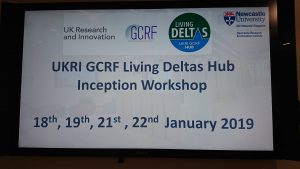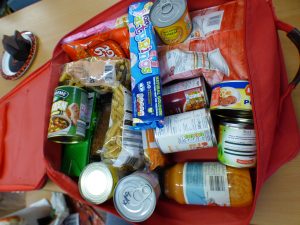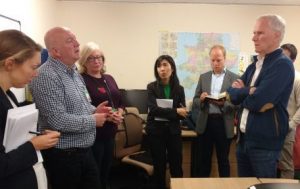The Newcastle Oral History Unit and Collective is celebrating its first full year of operation with our Annual Public Lecture in March. As with any new venture, it has been a year of learning, and an important part of that has been figuring out where we fit into the world of oral history. To help us with that, we made sure at least one member attended each of the four large oral history conferences held in Europe and North America in 2018*, to get a sense of the ‘state of the field’ that we are a part of. So, what have we learned?
Category Archives: Reflection
Living Deltas Hub: UKRI and GCRF
The Oral History Collective is delighted to be associated with the UK Research and Innovation (UKRI) Global Challenges Research Fund (GCRF) Living Deltas Hub. As part of a large, multi-disciplinary team, Professor Graham Smith and head of Newcastle University’s School of History, Professor Helen Berry, will lead a team of Research Associates a nd collaborative partners in history and oral history that will explore popular memories of environmental change across three of the world’s major delta regions. Here Graham reflects on just why the project is so exciting.
nd collaborative partners in history and oral history that will explore popular memories of environmental change across three of the world’s major delta regions. Here Graham reflects on just why the project is so exciting.
Children under the Nazis: Exhibition, Education, and Website
What was it like to be a child during Nazi rule, and what have children said about their experiences? These are the central questions driving Dr Beate Müller’s impact and engagement project on ‘Children under the Nazis’. Continue reading
“I was born poor, and I will die poor”: Reflections on disability, ill health and poverty in the age of Universal Credit

This Disability History Month, Silvie Fisch, director of Northern Cultural Projects and associate researcher with the Oral History Unit & Collective, shares some of the stories she heard during our Foodbank Histories project and reflects on the interconnections between disability, ill health and poverty in the age of Universal Credit.
Foodbank Histories meets the United Nations

When the United Nations Special Rapporteur for Extreme Poverty visited the Newcastle West End Foodbank in Wednesday, the Oral History Collective was invited along to share some of the research findings from our six-month Foodbank Histories project, a partnership with Northern Cultural Projects. This work is also part of the Being Human festival, 15-24 Nov. So why is it important?
Using imagination to connect with the recent and deep past
For many – maybe most – of us, imagination is what gets us interested in history in the first place. Recently, the oral history collective have been having a lot of conversations about the connections between oral history and creative practice, including creative interpretation of history. In this post, Alison Atkinson-Phillips takes us on a winding journey of reflection on oral history and imagination, and offers a round-up of some local examples.
Deindustrialisation, heritage and Memory: a New Network
In this Lug post, Andy Clark discusses a new network that he’s coordinating focused on deindustrialisation, heritage and memory. It aims to facilitate greater collaboration and discussion among academics, heritage groups, artists, and community historians interested in deindustrialisation and the memorialisation of manufacturing jobs and communities. Email andy.clark@newcastle.ac.uk to find out more, or to join the network’s mailing list.
Community Experiences of Serious Organised Crime in Scotland
In this Lug post, Andy Clark discusses his experience conducting research for the Scottish Government’s Cabinet Secretary for Justice. Along with a team of researchers, he contributed to, and co-authored, a major report focused on community experiences of Serious Organised Crime in Scotland. He reflects on utilising oral history methods to examine current experiences and problems in relation to organised crime, and contributing to a policy report.
In His Own Voice: Dr Julian Tudor Hart (9 March 1927- 1 July 2018)
In this blog post Graham Smith remembers the pioneering general practitioner Dr Julian Tudor Hart who died on the 1st of July. Graham interviewed him in June 1999.
Click HERE for a .mp3 audio extract from the interview and for a .pdf transcript of that extract: Tudor Hart in His Own Voice pt 1 extract 1
Digital humanities and oral history: Seminar series
The Oral History Collective’s Seminar Series brings scholars to Newcastle so we can learn about their work on a range of interesting project and topics. Primarily, though, the seminar series allows us to explore methodological questions. In June, Anisa Puri visits to talk about Australian Generations: Creating a Digital Oral History Project. It’s got Alison Atkinson-Phillips thinking about the relationship between oral history and digital humanities (and digital culture here at Newcastle).
